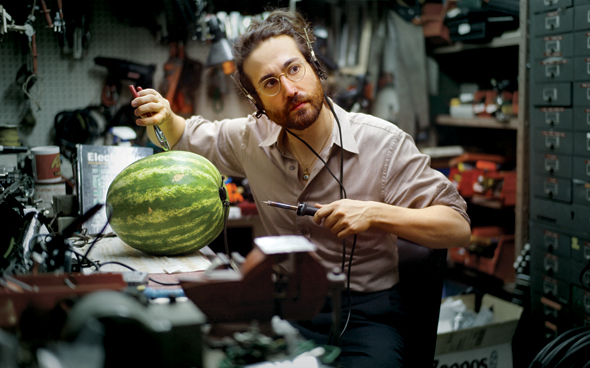
Sean Lennon is the son of John Lennon and Yoko Ono, and like his parents, he has a restless creative spirit that’s constantly veering off in unpredictable directions to create adventurous music. He has made solo albums of dreamy pop with a bossa nova flavor, co-written songs with Lenny Kravitz, played bass in the quirky pop group Cibo Matto, collaborated with Marianne Faithful and the Flaming Lips, and produced an album for Albert Hammond Jr. from the Strokes. His wide-ranging interests are on display in his two current projects. The jazzy, experimental rhythm and noise rock duo Mystical Weapons, with Deerhoof drummer Greg Saunier, lets him cut loose in a largely improvised format, while in Ghost of a Saber Tooth Tiger, he writes gentle folk-pop tunes with his girlfriend, Charlotte Kemp Muhl. He’s also helping out his mom on an album she’s making to celebrate her 80th birthday. Lennon spoke to SOMA from his home in New York City.
When did you get interested in music? Did you ever consider doing anything else?
I still consider doing real things in my life, at least once or twice a day. I came to music before the idea of making it a career ever occurred to me. When I was five, I was already playing. There were instruments all over the house, so I started before grammar school. When kids talked about being a doctor or a fireman, I was already making music. I never made a conscious choice; it just happened.
You’re one of the most versatile pop musicians around, constantly exploring new directions. How did you develop your taste in music?
I always liked a wide variety of things. I remember when I was young friends would say they only liked hip hop, or punk, or classical. I never focused on a specific genre in art, or food, or painting. If it’s a great country song, a great classical composition, a Hollywood blockbuster soundtrack, or an artsy Eastern European song, I like it. I don’t have a narrow set of styles I like. When I grew up, people were break-dancing and doing the lambada. My mom was playing me Schubert and avant-garde music. My dad being a Beatle made me identify with pop, rock and the legends of the ’60s, and in New York you get exposed to a wide variety of ingredients. People complain that I can’t decide on a style, but I’ve never been interested in a narrow wavelength of music. I like Ethiopian funk, Bach and psychedelic bands from the ’60s.
You seem to do more collaborations than solo projects of your own, true?
I wonder about that. I’m jealous of people who have a singular musical identity and can express themselves within it. I have a lot of influences and don’t have a single focus. I just helped my mom with a vocal on her 80th-birthday album. I’m not a songwriter who is dedicated to singing only my own songs. Maybe I should be, but I’m not.
You started your own label a few years ago. Aren’t any major labels after you?
[Laughs.] The majors don’t have an interest in me. I wouldn’t be good business for them. The majors are like a chain of fast food restaurants, and they need to sell a lot of meals to stay in business. My music isn’t the kind of fast food product they can sell, so I needed to start a small food restaurant with one table and one waiter. That’s more appropriate to the kind of work I’m doing. It’s like home cooking versus McDonalds. My music is handcrafted. I literally sell records out of the basement of my house. I don’t go door to door, but I mail them out myself. I want to make music for people who want to hear what I’m doing, not because I have a famous last name.
Is the legacy of your parents intimidating?
Sure. I’d have to be insane not to be intimidated, but I’m not any more intimidated by them than I am by any other amazing artist. Because they were my parents, they got demystified in my mind. They looked the way all parents look to their children. Jimi Hendrix or other artists from the ’60s still have a mythological quality about them, but as an artist, you can only compare yourself to what you’re doing. You can’t apply the same standards to today’s artists that applied in the ’60s. My circumstances today are different than what they were when my parents were starting out, so I give myself a break about it. I find their legacy intimating and inspiring at the same time.
Text by J. Poet